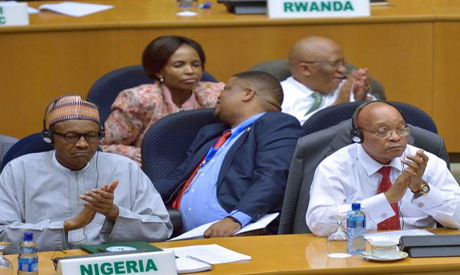
Nigeria's President Muhammadu Buhari (L) and his South African counterpart Jacob Zuma attend the African Union (AU) Peace and Security Council in Addis Ababa on January 29, 2016. (AFP)
African leaders met Saturday in a bid to end armed crises, including in troubled Burundi, with an unprecedented vote on deploying a 5,000-strong peacekeeping force despite Burundi's vehement opposition.
While the official theme of the African Union (AU) meeting is human rights, leaders are again dealing with a string of crises across the continent during two days of talks at the organisation's headquarters in the Ethiopian capital.
Talks at the AU Peace and Security Council, attended by presidents and foreign ministers from across the 54-member bloc, stretched late into Friday night in an attempt to narrow positions before the formal summit opened on Saturday.
AU commission chief Nkosazana Dlamini-Zuma opened the summit by commemorating AU peacekeepers killed in "efforts to silence the guns", amid fierce backroom debate on whether to send a new force to Burundi.
UN Secretary-General Ban Ki-moon warned that "leaders who stand by while civilians are slaughtered in their name must be held responsible," and said the crisis in Burundi required "most serious and urgent committment".
He said the UN backed the AU's proposal "to deploy human rights observers and to establish a prevention and protection mission" in Burundi.
Ban also warned of the need for action amid stalled talks to end war in South Sudan.
"Leaders in South Sudan have again failed to meet a deadline to form a transitional government," Ban said. "Instead of enjoying the fruits of independence, their people have endured more than two years of unimaginable suffering."
Neither Burundi's President Pierre Nkurunziza nor South Sudan President Salva Kiir are believed to be attending the summit.
"Leaders must protect their people, not themselves," Ban added.
AU Peace and Security Council chief Smail Chergui warned "the stakes are indeed high", but Burundi remained defiant in its opposition to a mission it calls an "invasion force".
Burundian Foreign Minster Alain Nyamitwe on Friday insisted he had the backing of other nations. Asked whether he had support of others in opposing the proposed force, Nyamitwe said, "Yes, very strong, you will see."
Street protests, a failed coup and now a simmering rebellion began when Nkurunziza announced his intention to run for a controversial third term, which he went on to win in July elections.
Hundreds have died and at least 230,000 have fled the country in the months since.
"We have said that the deployment of this force is not justified," Nyamitwe said. "We believe that the situation in the country is under control."With Nkurunziza unmoved by AU and UN appeals, there have already been moves to water down the proposed military force to that of an observer mission.
"It is not only Burundi that is resisting this idea... most interveners in a country are not welcomed," Gambian President Yahya Jammeh said.
Jammeh said he would not support a military deployment "without the consent of Burundi".
A two-thirds majority will be required to send the force, named the African Prevention and Protection Mission in Burundi (MAPROBU). It remains unclear who would be willing to contribute troops.
"In addition to Burundi's lobbying efforts, many heads of states will be reluctant to set a precedent of AU troop deployment in a country that clearly rejects it," said Yolande Bouka, of the Institute for Security Studies (ISS) think tank.
The summit will see the annual election of a new AU chairman to replace Zimbabwe's President Robert Mugabe in the ceremonial role.
Diplomats suggest Chadian President Idriss Deby could be nominated for the one-year presidency which rotates between different regions of the continent, with this year being Central Africa's turn.
Islamist insurgencies in Mali and Nigeria, violence and political instability in Libya and the formation of a new government in Central African Republic will be the other issues on the agenda.
Short link: